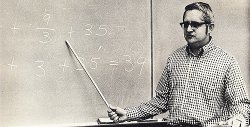Table of contents
Hey friends, I finally took UCLA's notoriously difficult (yet necessary) MATH 115A in Fall Quarter 2023.
In this article, I share my Lecture Notes, some advice on how to make the most of this class, and a selection of resources that complement this class nicely.
If that bores you and you want to get to the notes right away, feel free to use the Table of Contents (ToC) above!
Why MATH 115A?
Fact: To graduate with a UCLA Mathematics Degree (ranked 11th worldwide), you have to take MATH 115A (Linear Algebra).
Now, the reputation of this class precedes itself and it is very likely that you've heard about it from upperclassmen complaining about it. And you may be thinking to yourself: "Wait! I already took MATH 33A, which is Linear Algebra. Why do I have to take it again? In fact, MATH 33A is a pre-requisite for MATH 115A!"
That is a completely valid question that I've also posed, and this short section in this article is an attempt to answer it comprehensively and succinctly.
Essentially, MATH 115A pursues two primary objectives:
- (Re)-construct the foundations of linear algebra, this time in an abstract way. Note that Linear Algebra is widely agreed to be the foundation of many branches of Mathematics.
- Get familiar working with Mathematical concepts in an abstract manner (as opposed to computationally). Improve your ability to construct or follow a non-trivial mathematical argument.
Here, I explore these aims briefly, and it's advisable to keep them in mind as you progress through the course.
"To a large extent, the ability to do math is less about inherent talent or the "Math Gene". It is more about the ability to focus for long enough, such that one is able to follow through an involved series of logical inferences."
(1) Construct the foundations of Linear Algebra in an abstract way.
In introductory courses like Math 33A, linear algebra often revolves around matrix studies. However, at the 115A level, the focus shifts to exploring vector spaces and their transformations. If you're unfamiliar with the concept of a vector space, don't worry - we'll delve into it soon. For starters, consider $\mathbb{R}^n$ - the set of all $n$-tuples of real numbers - as your introductory vector space. Typically, this is the sole vector space explored in elementary linear algebra courses. In 115A, however, we'll expand our horizons, exploring linear algebra in various other vector spaces, which proves to be incredibly beneficial.
Our approach involves starting from the very basics. It is perhaps helpful to momentarily set aside all your previous mathematical knowledge and treat 115A as a foundational course designed to systematically build a specific mathematical field from the ground up. This is our initial aim in 115A.
A noteworthy point regarding this goal is the following: You might be anticipating that exploring linear algebra in vector spaces beyond $R^n$ will be a radically different and exciting experience. However, I must clarify that abstract linear algebra in general vector spaces largely mirrors the linear algebra you've encountered in $\mathbb{R}^n$. The concepts of linear independence, transformations, kernels, images, eigenvectors, and diagonalization - all familiar topics within the realm of $\mathbb{R}^n$ - function similarly in 115A.
(2) Construct and Follow Abstract Mathematical Arguments and Statements
This goal extends beyond mere proof-writing. Upper-division mathematics, in contrast to lower-division studies, prioritizes the discovery and articulation of truths over computation. In 115A, every solution you formulate should be viewed as a mini technical essay, marking a departure from mere scratch work to determine problem solutions. Mastering the art of clear, logical, and effective communication of mathematical truths is a challenging yet essential skill to develop.
The above section is very much inspired by Joseph Breen, a UCLA Mathematics Department Legend.
Resources
Here are a compilation of useful resources that will be immensely helpful in complementing the course.
Fantastic visualizations. Nothing quite like it to build intuition.

Linear Algebra legend, Gilbert Strang's lectures. More than 4 million views. Made available by MITOCW.

On Proof Obsession & No Tolerance for Lack of Insight.
Terence Tao's article - apt as you take one of your first upper-division Math courses.
Terence Tao again, for when things get tough.
Advice
Here is a list of strategies and advice that I found useful in navigating this challenging yet rewarding course. Some of these advice are in retrospect (i.e. things I would do if I were to re-take the course).
- Visualize it
- Linear Algebra is a topic that is especially rewarding when you see concepts visually. Certain definitions may seem abstract when presented as a string of math symbols, but once you can correctly visualize the concept, it is a good indication that your understanding and intuition is on the right track.
- Resource: Watch 3B1B's Essence of Linear Algebra playlist. Absolutely fantastic visualizations for these abstract concepts. See Resource section above for more.
- Write Proofs from Scratch
- Even if the Professor says that the exact proofs from class will not be tested in exams, it is important to understand them intuitively and be able to recreate them from scratch (i.e. if you were given a blank sheet of paper, you are able to write a complete proof of a theorem/proposition).
- This helps to develop your "ability to follow through an involved series of logical inference".
- Recognize that the proofs presented in lectures, while seemingly complex, are attainable. Spend time contemplating how you would arrive at these proofs yourself. It's a mentally demanding process but deeply rewarding.
- Read Cal Newport's article about how he got the highest grade in his Discrete Math class. His strategy? Proof obsession and no tolerance for Lack of Insight. Specifically read the part about how he learnt every proof in the course.
- Even if the Professor says that the exact proofs from class will not be tested in exams, it is important to understand them intuitively and be able to recreate them from scratch (i.e. if you were given a blank sheet of paper, you are able to write a complete proof of a theorem/proposition).
- Have Fun With It!
- Play with the theorem and propositions presented in class. Perhaps I spent too much time doing this instead of practice problems, but it was fun! How to "play" with it, you ask?
- Change the assumptions/conditions applied. What will "break" this theorem/proposition? Why? How does this affect things? Can you visualize the effect?
- Construct counterexamples. If a theorem or proposition states that under certain conditions a result holds, try to think of scenarios where these conditions are not met. What happens then? Can you construct an example where the theorem fails? This not only tests your understanding of the theorem but also helps in appreciating its boundaries.
- Act like a Mathematician (you are one!). Before studying the proof of a theorem, try testing it out. Is it true, based on the conditions given? Do you intuitively see why it is true? You should be able to construct the proof based on what you've learnt so far, you just have to be a bit more creative to see the trick! Can you do it?
- Don't spend more than 3 hours at a time working on these concepts. Don't pull all-nighters and grind through it all.
- Attack it repeatedly. With high energy. Again and again!
- Play with the theorem and propositions presented in class. Perhaps I spent too much time doing this instead of practice problems, but it was fun! How to "play" with it, you ask?
Notes
I openly welcome anyone to point out typos, incorrect statements, or send other suggestions on how to improve this Study Guide. Please email me at hi@jia-shing.com.
With that said, here are my Lecture Notes for MATH 115A.
MATH 115A Lecture Notes
A Quote
I'll end this short article with a quote. Hopefully, it'll act as a self reminder and I'll hold on to it for the remainder of my academic journey!
"Mathematics that is hastily learnt is easily forgotten."
